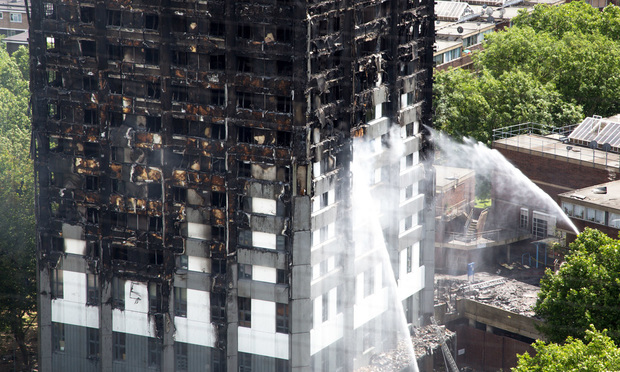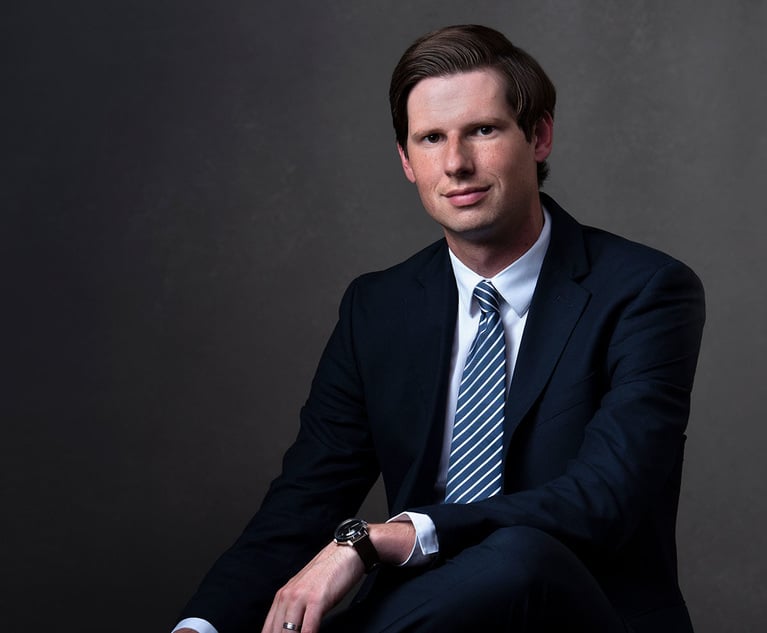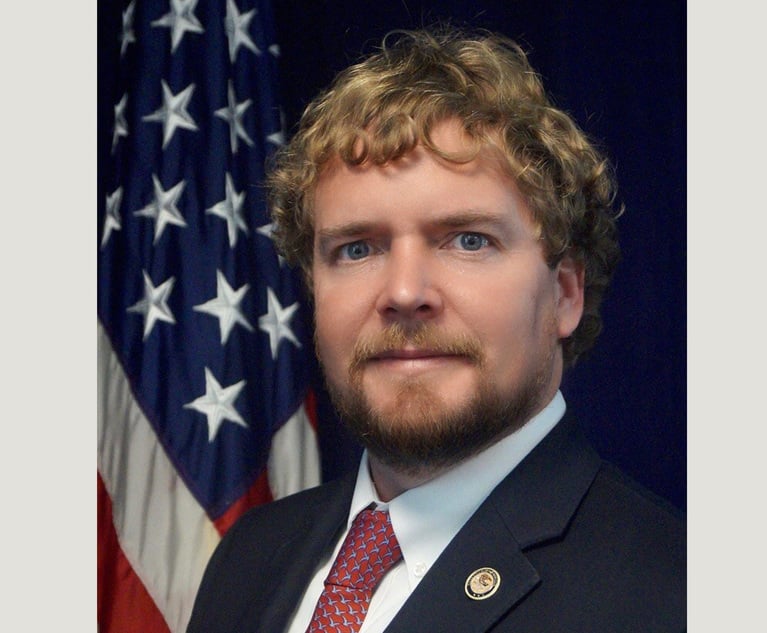Pa. Jurisdiction in Grenfell Tower Suit May Be Tested by Evolving Case Law
According to the attorneys who filed the lawsuit over the deadly 2017 fire in London's Grenfell Tower, the case, which involves more than 200 named plaintiffs, is one of the largest products liability lawsuits in Pennsylvania history. But whether the case remains in the Keystone State may depend on several issues currently working their way through the Pennsylvania appellate courts.
June 11, 2019 at 06:02 PM
6 minute read
 A hose continues to douse the fire at Grenfell Tower on June 15, 2017, in London. Photo: Thabo Jaiyesimi/Shutterstock
A hose continues to douse the fire at Grenfell Tower on June 15, 2017, in London. Photo: Thabo Jaiyesimi/Shutterstock
According to the attorneys who filed the lawsuit over the deadly 2017 fire in London's Grenfell Tower, the case, which involves more than 200 named plaintiffs, is one of the largest products liability lawsuits in Pennsylvania history. But whether the case remains in the Keystone State may depend on several issues currently working their way through the Pennsylvania appellate courts.
The massive lawsuit stems from the June 2017 fire that engulfed a 24-story building in the North Kensington section of West London. The fire, allegedly ignited by a defective refrigerator and exacerbated by faulty cladding and insulation, burned for several hours and eventually left 72 dead and dozens more injured.
Attorneys from Saltz Mongeluzzi Barrett & Bendesky and DiCello Levitt filed a 575-page complaint June 6 in the Philadelphia Court of Common Pleas, bringing claims on behalf of 177 survivors and 69 families of the deceased. The lawsuit lodges products liability claims against three defendant companies—two of which have a significant presence in Pennsylvania.
Attorneys who spoke with The Legal largely said chances are good the case will remain in Pennsylvania, and all noted that the claims delve into issues of general and specific jurisdiction that Pennsylvania appellate courts are currently grappling with.
“This firm is so often at the cutting edge of legal issues, and they have a lot of big corporate jurisdiction issues tied together in this case, issues that are sort of hot in Pennsylvania right now,” John Hare, co-chair of Marshall Dennehey Warner Coleman & Goggin's appellate advocacy and post-trial practice group, who is not involved in the case, said.
The plaintiffs said the two companies—Arconic, which made the cladding, and Celotex, which made the insulation—are headquartered in Pittsburgh and Malvern, Pennsylvania, respectively. In an effort to establish layers of jurisdiction, the plaintiffs also further argued that the companies designed and marketed the allegedly defective products in Pennsylvania.
“While the flames began in a flat in Grenfell Tower in London, the spark for this fire, this inferno, occurred in Pennsylvania,” Robert Mongeluzzi said at a press conference Tuesday outlining the allegations.
Mongeluzzi made the statement before noting that Malvern was visible from the firm's 52nd-floor offices in Center City, Philadelphia, where the press conference was taking place.
Adam Levitt of Chicago-based DiCello Levitt also said during the press conference that victims sue outside their home state “every single day.”
“What we are doing here, seeking to hold U.S. companies responsible for wrongful conduct that happened overseas, happens all the time,” he said, noting recent litigation over crashes involving Boeing's 737 Max 8.
Lawyers who are not involved in the case but have represented plaintiffs in similar complex products liability cases agreed, and said it is unlikely the case will get booted from Philadelphia.
Alan Feldman of Feldman Shepherd Wohlgelernter Weinstock & Dodig sued the Swedish company IKEA in Pennsylvania on behalf of plaintiffs from California, Minnesota, Washington and Pennsylvania. Those cases involved arguments that Pennsylvania had jurisdiction over the claims because IKEA's national headquarters are located in the Keystone State. IKEA contested the characterization, but the litigation eventually settled for $50 million before a court could make a ruling.
Including those allegations about the companies' headquarters, Feldman all but ensured the case will make it beyond summary judgment.
“If a company is based in Pennsylvania and manufacturing products anywhere in the world, a defendant should reasonably understand and recognize that Pennsylvania product liability law will likely apply to evaluate the safety of those products,” Feldman said. “I think the lawsuit almost certainly will proceed in Pennsylvania.”
Duffy + Fulginiti attorney Kenneth Fulginiti also saw it as likely the case will be litigated in Philadelphia.
“If the defendants are from the U.S., they're going to have a very high burden to claim the case should be in England,” Fulginiti said.
Fulginiti said Pennsylvania's business registration law, which establishes jurisdiction simply by agreeing to do business in the state, adds a clear layer of jurisdiction for the Keystone State.
“Our constitution allows for jurisdiction within our state if you're registered to do business here, even if they're not headquartered here,” Fulginiti said.
The corporate registration issue was recently ruled on by the Pennsylvania Superior Court, which said that consenting to do business in Pennsylvania was sufficient to establish jurisdiction. The court, however, agreed in December to have an en banc panel take another look at that issue, and given the significance, it is likely the state Supreme Court will eventually get involved.
“The suggestion that one or more of the defendants are headquartered in Pennsylvania seems to be an effort to satisfy the U.S. Supreme Court's due process standard, which is [that the lawsuit is brought where the company has its] principal place of business,” Hare said.
Attorneys agreed the defendants will likely dispute allegations about where they are headquartered, and those determinations are often highly fact-specific.
However, if the courts ultimately find that the companies are not headquartered in Pennsylvania, that does not mean the cases will be tossed from Pennsylvania. The plaintiffs have alleged that the design and marketing decisions directly led to the devastating fire, and those allegations could be used to establish yet another lawyer of jurisdiction—one that the Pennsylvania Supreme Court is currently evaluating.
In April, Pennsylvania's high court agreed to hear arguments over how to apply the U.S. Supreme Court's high-profile decision in Bristol-Myers Squibb v. Superior Court of California, which made clear that out-of-state plaintiffs can't sue companies where the defendants aren't considered to be “at home,” or haven't conducted business directly linked to the claimed injury.
The case currently before the Pennsylvania justices deals with New Jersey-based Ethicon's use of a Pennsylvania company to manufacture the pelvic mesh device at the heart of the plaintiff's claims.
Attorneys agreed the defendants will likely also dispute the role the Pennsylvania wings of the companies played in developing the devices at issue.
However, if the headquarters are found to be in Pennsylvania, jurisdiction will be clear.
“If that's true, whether you apply the Bristol-Myers case, or the more favorable registering to do business in Pennsylvania test, I think they're fine,” Feldman said.
Feldman and Fulginiti both said possibly the biggest dispute will be over the choice of law for damages. Application of English law typically does not result in as significant recoveries, so it is likely the defendants will push to have English law apply to the damages. But the attorneys said plaintiffs should have good arguments to make if it gets to that issue.
And all these issues, attorneys said, are likely to put pressure on a possible settlement.
This content has been archived. It is available through our partners, LexisNexis® and Bloomberg Law.
To view this content, please continue to their sites.
Not a Lexis Subscriber?
Subscribe Now
Not a Bloomberg Law Subscriber?
Subscribe Now
NOT FOR REPRINT
© 2025 ALM Global, LLC, All Rights Reserved. Request academic re-use from www.copyright.com. All other uses, submit a request to [email protected]. For more information visit Asset & Logo Licensing.
You Might Like
View All

Superior Court Directs Western Pa. Judge to Recuse From Case Over Business Ties to Defendant
3 minute read

Trending Stories
- 1Decision of the Day: Judge Dismisses Defamation Suit by New York Philharmonic Oboist Accused of Sexual Misconduct
- 2California Court Denies Apple's Motion to Strike Allegations in Gender Bias Class Action
- 3US DOJ Threatens to Prosecute Local Officials Who Don't Aid Immigration Enforcement
- 4Kirkland Is Entering a New Market. Will Its Rates Get a Warm Welcome?
- 5African Law Firm Investigated Over ‘AI-Generated’ Case References
Who Got The Work
J. Brugh Lower of Gibbons has entered an appearance for industrial equipment supplier Devco Corporation in a pending trademark infringement lawsuit. The suit, accusing the defendant of selling knock-off Graco products, was filed Dec. 18 in New Jersey District Court by Rivkin Radler on behalf of Graco Inc. and Graco Minnesota. The case, assigned to U.S. District Judge Zahid N. Quraishi, is 3:24-cv-11294, Graco Inc. et al v. Devco Corporation.
Who Got The Work
Rebecca Maller-Stein and Kent A. Yalowitz of Arnold & Porter Kaye Scholer have entered their appearances for Hanaco Venture Capital and its executives, Lior Prosor and David Frankel, in a pending securities lawsuit. The action, filed on Dec. 24 in New York Southern District Court by Zell, Aron & Co. on behalf of Goldeneye Advisors, accuses the defendants of negligently and fraudulently managing the plaintiff's $1 million investment. The case, assigned to U.S. District Judge Vernon S. Broderick, is 1:24-cv-09918, Goldeneye Advisors, LLC v. Hanaco Venture Capital, Ltd. et al.
Who Got The Work
Attorneys from A&O Shearman has stepped in as defense counsel for Toronto-Dominion Bank and other defendants in a pending securities class action. The suit, filed Dec. 11 in New York Southern District Court by Bleichmar Fonti & Auld, accuses the defendants of concealing the bank's 'pervasive' deficiencies in regards to its compliance with the Bank Secrecy Act and the quality of its anti-money laundering controls. The case, assigned to U.S. District Judge Arun Subramanian, is 1:24-cv-09445, Gonzalez v. The Toronto-Dominion Bank et al.
Who Got The Work
Crown Castle International, a Pennsylvania company providing shared communications infrastructure, has turned to Luke D. Wolf of Gordon Rees Scully Mansukhani to fend off a pending breach-of-contract lawsuit. The court action, filed Nov. 25 in Michigan Eastern District Court by Hooper Hathaway PC on behalf of The Town Residences LLC, accuses Crown Castle of failing to transfer approximately $30,000 in utility payments from T-Mobile in breach of a roof-top lease and assignment agreement. The case, assigned to U.S. District Judge Susan K. Declercq, is 2:24-cv-13131, The Town Residences LLC v. T-Mobile US, Inc. et al.
Who Got The Work
Wilfred P. Coronato and Daniel M. Schwartz of McCarter & English have stepped in as defense counsel to Electrolux Home Products Inc. in a pending product liability lawsuit. The court action, filed Nov. 26 in New York Eastern District Court by Poulos Lopiccolo PC and Nagel Rice LLP on behalf of David Stern, alleges that the defendant's refrigerators’ drawers and shelving repeatedly break and fall apart within months after purchase. The case, assigned to U.S. District Judge Joan M. Azrack, is 2:24-cv-08204, Stern v. Electrolux Home Products, Inc.
Featured Firms
Law Offices of Gary Martin Hays & Associates, P.C.
(470) 294-1674
Law Offices of Mark E. Salomone
(857) 444-6468
Smith & Hassler
(713) 739-1250





